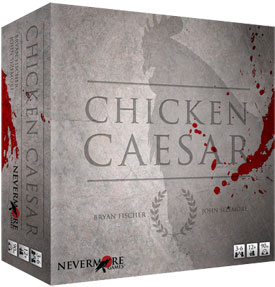



play board games
Board game reviews, strategy tips & session reports
Chicken Caesar Board Game Review
 Stats:
Stats:
No. of players: 3-6
Amount of time to play: 90 min
Age requirements: 12+
Set-up time: 5 min
Chicken Caesar is a game of politics, intrigue and fowl-play. You must gain more renown with your chickens than your opponents and be careful not to be eaten by the fox.
Chicken Caesar Description:
Chicken Caesar is a game about roosters adopting a Roman-style government to the rule their chicken coop. You win by gaining more renown than the other players. Renown is gained by holding an office.
The game begins with players placing their chickens on the open office spots. Each round after the first chickens may advance to open offices. This can happen through seniority or voting. If you want to vote for your own chickens to advance you must pay one coin.
Next each office takes their actions. Then players with chickens in the Aedile set the tax rate and those in the Praetor place the guards and traitors face-down next the offices. The number of traitors is determined by the tax rate. The Censor can exile a chicken and gain a coin. This exiled chicken is immune to attack and returns to the coop in the next round. Consuls decide whether monuments can be improved and take the offering left for approving the improvement.
Any chicken in office gets a token for holding that office that is placed on their card. If the chicken collecting a token already has that token it is set aside for later. In addition to collecting a token of office Caesar and the tax people get some money for holding their positions. The amount collected is determined by the tax rate. Another benefit of being Caesar is he can veto one vote.
After gathering your rewards the fox comes. You flip over the guard and traitor cards next to an office. For each traitor that outnumbers the guards one chicken in that office will die. To determine who dies, you’ll have a vote. One chicken in the Consul’s Office may be saved if the players give three coins to the bank.
If any chickens died because of the fox attack, Caesar dies too. The Censor returns to the coop. And taxes are adjusted plus or minus two depending on whether any chickens died.
Finally your dead chickens are given a monument which can be improved. To improve a monument you place any tokens you set aside with at least one coin next to one of your dead chickens. If a Consul approves your improvement you add that token to the associated chicken’s card.
When voting you must follow these guidelines: You can nominate a rooster, second a nomination or abstain from voting by paying one coin. Also if the vote is for advancement you must pay one coin to nominate one of your own chickens. You can negotiate, bribe and lie, but all promises bought using money are binding.
The game ends when there are not enough live chickens to fill the open positions, there are no more tokens for a specific office or one player is totally out of roosters. You total your tokens from all your chickens and they are worth money. So are any tokens you set aside that did not get on monuments. You add the money you gain from these to what you had at the end of the game and the player with the most wins.
Quick Review of Chicken Caesar:
Chicken Caesar is a game of politicking and negotiation. You must be shrewd and make deals that benefit you more than the other players. Many times you will have to have a cut-throat attitude when dealing with other players. With the right group this game can be a lot of fun.
The components for the game are very good. I like the design of the game as it adds to the theme. The cards, art and token are all top-notch. The rules are a tough read and you should probably read them, then find a video walkthrough and then read the rules again. It isn’t that the rules are poorly written, they are just complicated.
The theme for the game is great. Like I said above, player interactions in this game can be tough, but the light theme help lighten the mood a bit.
I also like the checks and balances of the offices. Since the offices are so intertwined you must pay attention to all of them. You need to learn to take advantage of the offices you are in to get the most gain.
The speed of the game once learned is pretty quick. I feel some negotiation game can really drag on but this one moves at a good clip due the rules on voting.
How much you and your group enjoy Chicken Caesar will depend on the players. Do they like social games with table talk, bribes and bluffing? If you answered yes you should try this game out. If your game doesn’t like to double-cross each other you might want to pass on this one.
Score and synopsis: (Click here for an explanation of these review categories.)
Strategy 4 out of 6
Luck 1 out of 6
Player Interaction 6 out of 6
Replay Value 4 out of 6
Complexity 5 out of 6
Fun 4 out of 6
Overall 4 out of 6 (my group tends to not like these types of games or this would be higher)

Leave a Reply